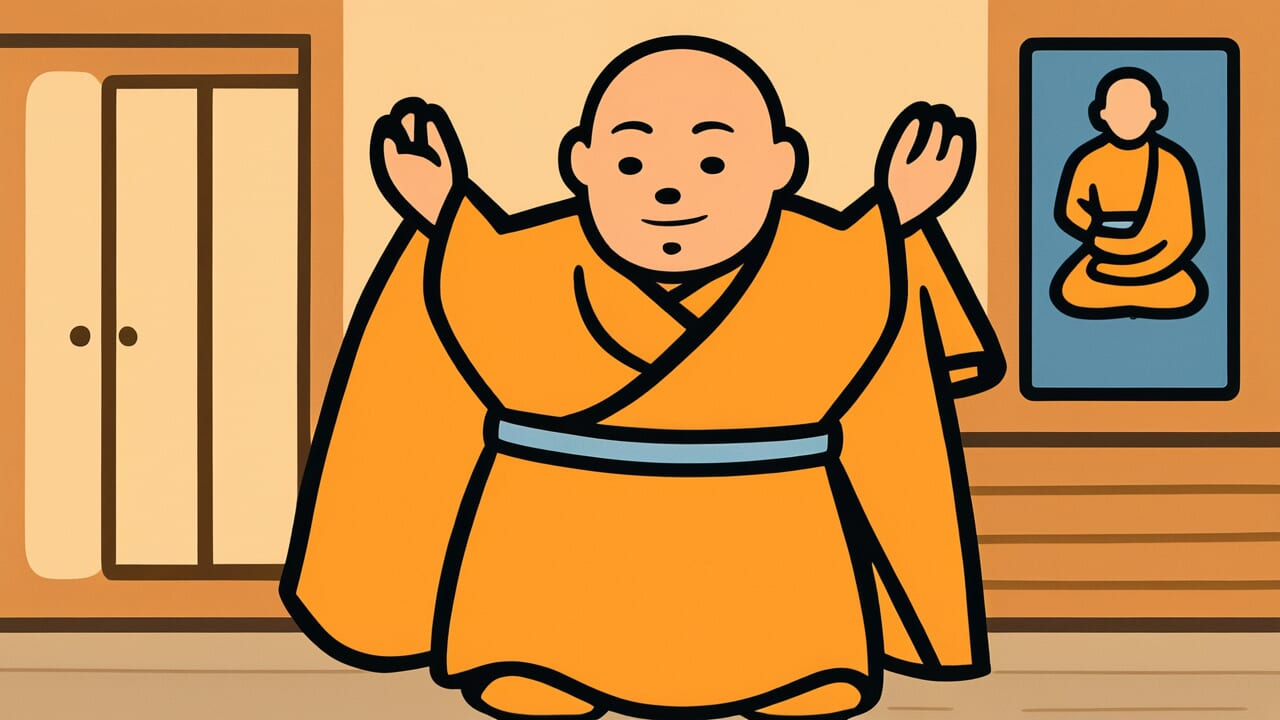How to Read “Wear the priest’s robe and vestments in your heart”
Kesa to koromo wa kokoro ni kiyo
Meaning of “Wear the priest’s robe and vestments in your heart”
This proverb teaches that cultivating your inner self matters more than perfecting your outward appearance or following formalities. No matter how impressive your clothing or titles may be, they mean nothing if your heart doesn’t match.
On the other hand, even someone dressed simply deserves true respect if their character is refined. The real measure of a person lies within.
People use this saying to warn those who focus too much on status or appearance. It also criticizes situations where the form looks good but the substance is missing. You can even use it to remind yourself to stay grounded.
Modern society often values external things like brand names, academic credentials, and job titles. This proverb reminds us that what truly matters is character and integrity.
It teaches us not to be fooled by flashy appearances. Instead, we should develop the ability to see what’s truly important beneath the surface.
Origin and Etymology
The exact source of this proverb remains debated, but it clearly has deep roots in Buddhist teachings. The kesa is the ceremonial robe worn by monks, a garment with profound significance in Buddhism. The koromo refers to ordinary clothing.
Buddhism has long emphasized inner cultivation over outward forms and appearances. No matter how magnificent a kesa you wear, you cannot be called a true monk if your heart lacks spiritual depth. This core belief runs throughout Buddhist thought.
Zen Buddhism includes teachings that express a similar idea: wearing robes is an act of the heart, not just the body. This philosophy was widely embraced across Japanese society.
What’s fascinating is how this proverb spread beyond monks to ordinary people. Warriors, merchants, and others in various social positions all learned this lesson. Looking impressive matters less than having genuine character.
Similar expressions appear in Edo period moral instruction books. This suggests the teaching took root among common people as ethical guidance.
The proverb warns against human tendency toward empty formalism. It represents a core aspect of Japanese spirituality and continues to be passed down through generations today.
Usage Examples
- He obsesses over job titles, but as “Wear the priest’s robe and vestments in your heart” teaches, he should focus on developing his character first
- Before buying an expensive suit, I’ll follow the spirit of “Wear the priest’s robe and vestments in your heart” and examine my inner self instead
Universal Wisdom
Humans have a fundamental desire to decorate what others can see. Wanting nice clothes, impressive titles, and recognition from others is a natural feeling we all share.
Yet this proverb has been passed down for hundreds of years precisely because people easily drown in these desires and lose sight of what’s essential.
Improving your appearance is relatively easy. Money can buy nice clothes. Effort might earn you titles. But refining your inner character cannot happen overnight.
Sincerity, compassion, and humility only grow through daily practice and accumulation. That’s why people take shortcuts by decorating their exteriors instead.
Our ancestors understood this human weakness deeply. They also knew the emptiness of a life focused only on appearances.
No matter how impressive you look, you cannot find happiness if your heart doesn’t match. Eventually, people around you will notice that emptiness too.
To live a truly fulfilling life, you must invest effort in the invisible parts of yourself. This proverb continues to convey this truth quietly but powerfully.
When AI Hears This
Embodied cognition theory in cognitive science reveals that humans always rely on physical experience as scaffolding when understanding abstract concepts. For example, experiments show people judge others more favorably right after holding a warm coffee.
In other words, the mind cannot function without the body as its medium. This is where modern science has arrived.
Yet this proverb demands the exact opposite. Don’t wear the kesa as physical cloth on your body. Wear it in your heart instead.
This looks like an attempt to transcend embodied cognition while knowing about it a thousand years early. The human brain responds strongly to visual information. Research on “enclothed cognition” shows that wearing a lab coat improves concentration.
When monks wear the kesa, its weight and texture should automatically trigger a reverent mindset.
But Buddhism saw a trap there. When you go through the body, your mind inevitably gets dragged by physical sensations. You might feel satisfied by the kesa’s magnificence or lose focus when not wearing it.
True practice means letting go of the convenient scaffold of the body and grasping essence directly with the mind. This challenges what cognitive science proves “impossible.”
Perhaps it was a grand experiment to transcend human cognitive limits. By turning embodiment on its head and deliberately bypassing the body, it explores an alternative cognitive path. That’s where Eastern philosophy shows its uniqueness.
Lessons for Today
Modern society excessively values appearance and titles through social media and mass media. We judge people by visible metrics like likes, followers, academic degrees, and income. The trend grows stronger every day.
But this proverb reminds us of something crucial. True value lies in parts that cannot be measured numerically.
You can start today with small acts of inner cultivation. Act with integrity when nobody’s watching. Notice someone struggling and offer help. Reflect on your words and actions with honest self-examination.
These unglamorous accumulations form your true value as a person. You don’t need to reject caring about appearance. But spend equal or greater time polishing your heart.
Strangely, as your inner life grows richer, attachment to appearance naturally fades. People around you begin noticing your essential charm.
Not superficial shine, but character radiating from within truly attracts others. That’s the real power that draws people to you.



Comments